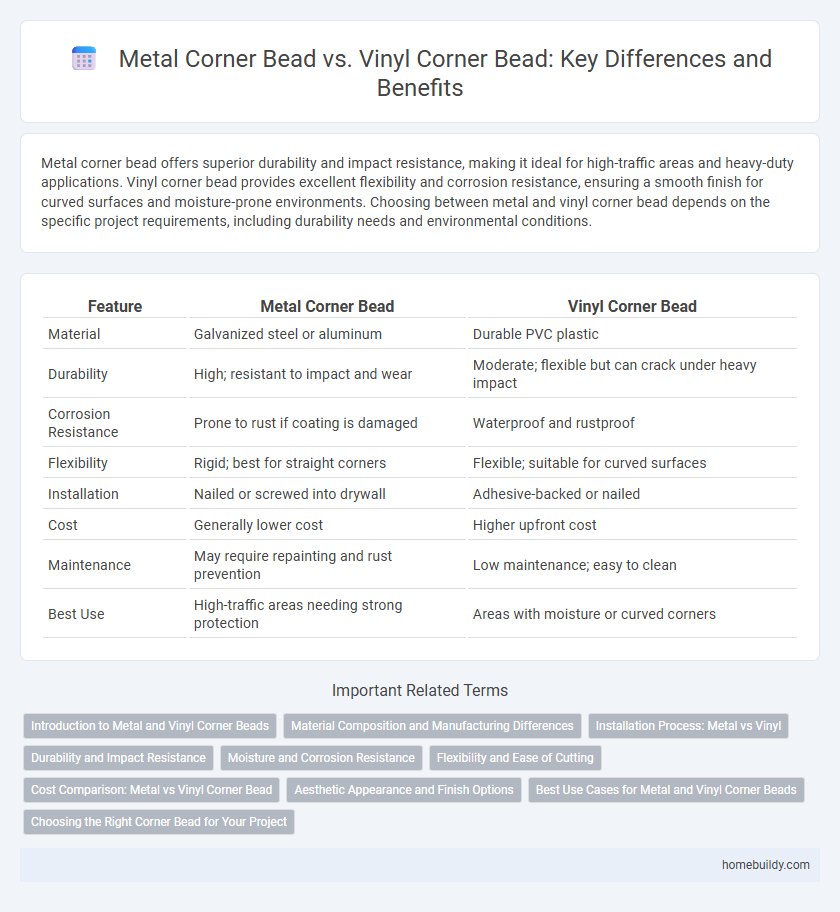Metal corner bead offers superior durability and impact resistance, making it ideal for high-traffic areas and heavy-duty applications. Vinyl corner bead provides excellent flexibility and corrosion resistance, ensuring a smooth finish for curved surfaces and moisture-prone environments. Choosing between metal and vinyl corner bead depends on the specific project requirements, including durability needs and environmental conditions.
Table of Comparison
| Feature | Metal Corner Bead | Vinyl Corner Bead |
|---|---|---|
| Material | Galvanized steel or aluminum | Durable PVC plastic |
| Durability | High; resistant to impact and wear | Moderate; flexible but can crack under heavy impact |
| Corrosion Resistance | Prone to rust if coating is damaged | Waterproof and rustproof |
| Flexibility | Rigid; best for straight corners | Flexible; suitable for curved surfaces |
| Installation | Nailed or screwed into drywall | Adhesive-backed or nailed |
| Cost | Generally lower cost | Higher upfront cost |
| Maintenance | May require repainting and rust prevention | Low maintenance; easy to clean |
| Best Use | High-traffic areas needing strong protection | Areas with moisture or curved corners |
Introduction to Metal and Vinyl Corner Beads
Metal corner beads offer superior durability and impact resistance, making them ideal for high-traffic areas and commercial applications. Vinyl corner beads provide flexibility and corrosion resistance, suited for residential projects where moisture or mold resistance is essential. Both types ensure crisp, clean drywall corners, but metal excels in strength while vinyl adapts better to curved surfaces.
Material Composition and Manufacturing Differences
Metal corner bead is typically made from galvanized steel or aluminum, offering high durability and corrosion resistance due to its metal composition. Vinyl corner bead consists of PVC, which provides flexibility, impact resistance, and enhanced moisture resistance compared to metal options. Manufacturing processes for metal corner beads involve rolling and punching steel sheets, while vinyl corner beads are extruded through molds to achieve their shape and texture.
Installation Process: Metal vs Vinyl
Metal corner bead installation requires cutting with tin snips and attaching with nails or screws, ensuring a tight fit on drywall corners for durability. Vinyl corner bead is easier to cut using a utility knife and typically fastened with adhesive or staples, offering a quicker, less labor-intensive process. While metal demands more precision and tools, vinyl provides greater flexibility and speed during installation, making it suitable for curved or irregular surfaces.
Durability and Impact Resistance
Metal corner bead offers superior impact resistance and durability, making it ideal for high-traffic areas and commercial applications due to its rigid structure and resistance to denting. Vinyl corner bead provides excellent flexibility and moisture resistance, reducing the risk of cracking in environments prone to humidity and minor impacts. Choosing between metal and vinyl corner bead depends on the specific requirements for longevity and resilience against physical damage in the installation area.
Moisture and Corrosion Resistance
Metal corner beads provide robust structural support but are susceptible to corrosion and rust when exposed to moisture, especially in humid or wet environments. Vinyl corner beads offer superior moisture resistance and do not corrode, making them ideal for areas prone to dampness or frequent water exposure. Choosing vinyl corner beads improves long-term durability and reduces maintenance needs in moisture-prone applications compared to metal alternatives.
Flexibility and Ease of Cutting
Metal corner bead offers less flexibility and requires specialized tools for cutting, often making installation more labor-intensive and time-consuming. Vinyl corner bead provides superior flexibility, allowing it to conform easily to irregular surfaces and is simpler to cut with standard utility knives, enhancing installation efficiency. The ease of cutting and adaptability of vinyl corner bead make it ideal for complex or curved drywall applications compared to rigid metal options.
Cost Comparison: Metal vs Vinyl Corner Bead
Metal corner bead typically costs more upfront than vinyl corner bead due to the durability and strength of materials like galvanized steel or aluminum. Vinyl corner bead offers a lower initial expense and is resistant to rust and corrosion, making it a budget-friendly choice for environments with moisture exposure. The long-term cost-effectiveness of metal versus vinyl depends on factors like installation complexity, maintenance requirements, and project location.
Aesthetic Appearance and Finish Options
Metal corner beads offer a sleek, durable finish with sharp, clean lines that enhance modern and industrial aesthetics, available in galvanized steel or aluminum for added rust resistance. Vinyl corner beads provide a smoother, more flexible finish that easily blends with various wall textures and paint colors, ideal for softer, more uniform appearances. Both options support different finish techniques, but metal's metallic sheen contrasts with vinyl's matte surface, allowing tailored aesthetic choices based on design requirements.
Best Use Cases for Metal and Vinyl Corner Beads
Metal corner beads, typically made from galvanized steel or aluminum, are ideal for high-impact areas such as commercial buildings, garages, and industrial settings where durability and resistance to dents are critical. Vinyl corner beads offer excellent moisture resistance and flexibility, making them the preferred choice for residential bathrooms, kitchens, and exterior corners exposed to varying weather conditions. Selecting metal or vinyl corner beads depends on assessing environmental factors, potential wear and tear, and installation surface requirements to ensure optimal protection and longevity.
Choosing the Right Corner Bead for Your Project
Metal corner bead offers superior durability and impact resistance, ideal for high-traffic areas or commercial projects requiring long-lasting protection. Vinyl corner bead provides flexibility, corrosion resistance, and easy installation, making it suitable for environments prone to moisture or minor damage. Selecting the right corner bead depends on project requirements such as durability, environmental conditions, and installation preferences to ensure optimal performance and finish.
Metal corner bead vs Vinyl corner bead Infographic

 homebuildy.com
homebuildy.com